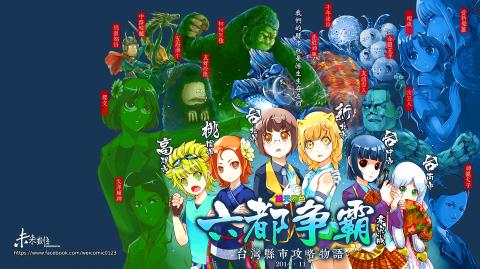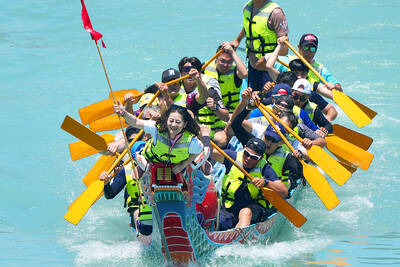With everyone’s eyes on the seven-in-one elections at the end of November, Taiwanese comic book artist Wei Zhong-cheng (韋宗成) has sought to bring a light touch to the potentially intense political event in his new work.
In Wei’s new comic, titled The Battle of the Six Special Municipalities (六都爭霸), the five special municipalities and Taoyuan County, which is due to be upgraded to a special municipality on Dec. 25, are each personified by a manga character.
Being Taiwan’s wealthiest administrative region, Taipei is portrayed as a suit-wearing rich boy, while Greater Taichung, which has been notorious for gang-related crime, is represented by a pistol-wielding young female student.

Photo courtesy of Future-Digi Ltd
As a city that takes pride in its rich historical and cultural legacy, Greater Tainan is pictured as a bashful girl clad in a traditional Chinese outfit.
Greater Kaoshiung, which has drawn tourists because of its constant sunny weather, is painted as a spirited and energetic teenage boy.
New Taipei City, which is home to Houtong (猴硐) — a small town nicknamed “Cat Town” due to its large cat population — is a naive cat girl.
Taoyuan, the nation’s biggest Hakka county, is personified as a feisty girl wearing a traditional Hakka costume and a tung blossom — a traditional symbol of Hakka culture — in her hair.
“My new comic book features a number of four-panel comic strips depicting various manga characters that I think best encapsulate the cities’ respective local features and customs and the lifestyles of their people,” Wei said.
Wei said any current events could also become the subjects of his new book, such as the Sunflower student movement in March and the antinuclear movement last month.
“These issues all play a part in the lives of Taipei residents,” Wei said.
Describing himself as a “citizen concerned about his country and his people in a time of social turmoil,” Wei catapulted to fame in the comic art community about five years ago after the huge hit of his first book, The Arrival of Emperor Ma (馬皇降臨), a political satire manga that mocks President Ma Ying-jeou (馬英九) and other political heavyweights.
The 32-year-old’s subsequent works, such as The Battle of the Five Special Municipalities (五都爭霸) and Taiwan National Army Act Corporation (新世紀國軍戰士), are also bestsellers and have helped him establish a large fan base.
Several incumbent mayors and mayoral hopefuls are also featured in Wei’s work, including National Taiwan University Hospital physician Ko Wen-je (柯文哲), an independent hopeful for Taipei mayor, and former Taipei Easycard Corp president Sean Lien (連勝文), the Chinese Nationalist Party’s (KMT) Taipei mayoral candidate.
Nevertheless, Wei said his goal is to bring out the cultural differences between the special municipalities, rather than drawing attention to the political figures.
“I want my readers to understand the differences between Greater Kaohsiung and Greater Tainan food, as well as Taipei residents’ favorite cuisines and pastimes,” Wei said.
“The stars in my book are the six special municipalities and the politicians are often depicted as needing to bring on their A-games to gain people’s support,” he said.
Wei’s new comic work is to be released in stages on his Facebook starting in the coming weeks, with a full version available on the market at the end of this year.

Taipei has once again made it to the top 100 in Oxford Economics’ Global Cities Index 2025 report, moving up five places from last year to 60. The annual index, which was published last month, evaluated 1,000 of the most populated metropolises based on five indices — economics, human capital, quality of life, environment and governance. New York maintained its top spot this year, placing first in the economics index thanks to the strength of its vibrant financial industry and economic stability. Taipei ranked 263rd in economics, 44th in human capital, 15th in quality of life, 284th for environment and 75th in governance,

The Sports Administration yesterday demanded an apology from the national table tennis association for barring 17-year-old Yeh Yi-tian (葉伊恬) from competing in the upcoming World Table Tennis (WTT) United States Smash tournament in Las Vegas this July. The sports agency said in a statement that the Chinese Taipei Table Tennis Association (CTTTA) must explain to the public why it withdrew Yeh from the WTT tournament in Las Vegas. The sports agency said it contacted the association to express its disapproval of the decision-making process after receiving a complaint from Yeh’s coach, Chuang

Control Yuan Secretary-General Lee Chun-yi (李俊俋) tendered his resignation last night, admitting that he had misused a government vehicle, as reported by media. His resignation was immediately accepted by the Control Yuan. In a statement explaining why he had resigned, Lee apologized for using a Control Yuan vehicle to transport his dog to a pet grooming salon on May 20. The issue first came to light late last month, when TVBS News reported that Lee had instructed his driver to take the dog to the salon. The news channel broadcast photos that it said were taken by an unnamed whistle-blower, which purportedly showed the

Democratic Progressive Party caucus chief executive Rosalia Wu, front, grabs the pennant in a dragon boat race hosted by Qu Yuan Temple in the Shuanghsi River in Taipei’s Beitou District yesterday.